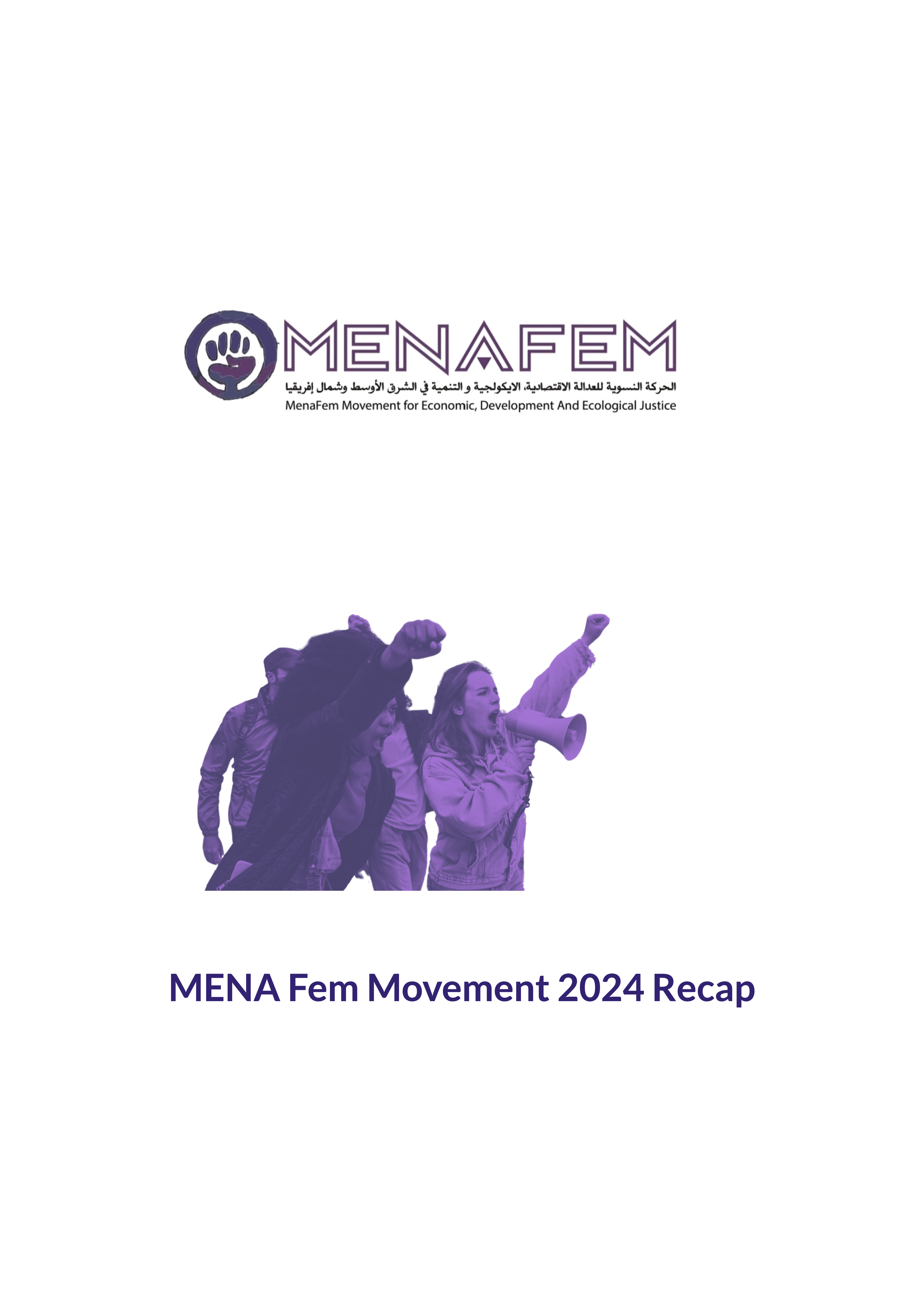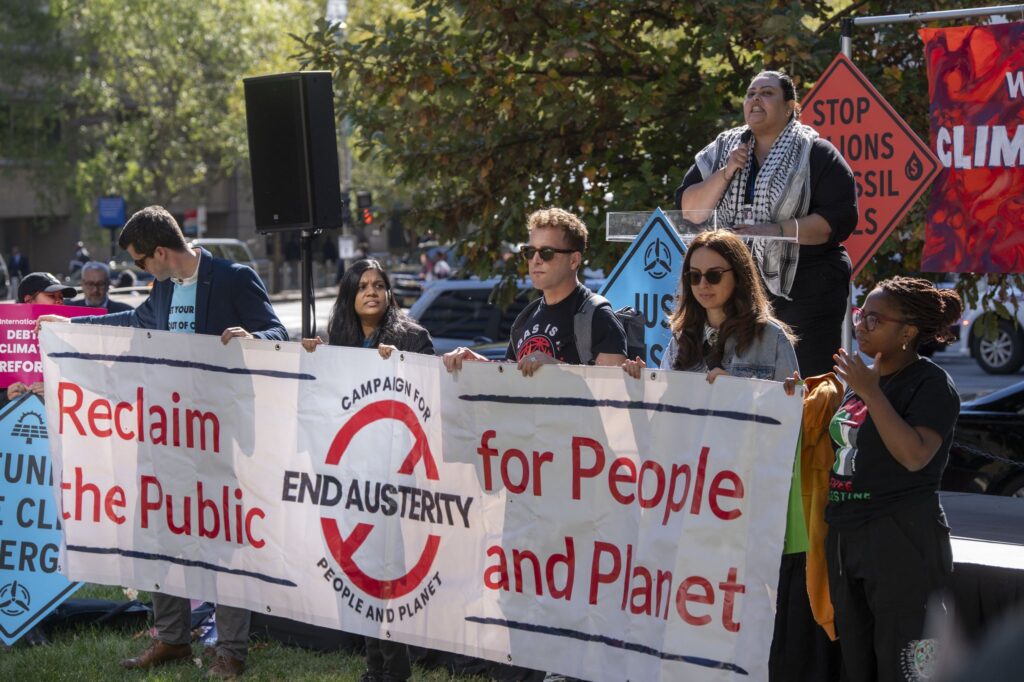MENA Fem Movement 2024 Recap
As we approach the end of the year, MENA Fem Movement recognizes the immense efforts made by civil society actors, activists, and feminists across the globe to bring about a more just, equitable, and sustainable global economic structure. We would like to, once again, reiterate our full solidarity with Palestine, Lebanon, Sudan, and all countries of the Global South under colonial aggression.
Against this context of genocide and colonial aggression in our region, MENA Fem Movement has been working to transform the neocolonial international financial architecture that enables this violence against Global South countries. For a nascent movement, MENAFem has made significant strides within the spaces of this architecture, namely IFls and MDBs.
Campaigns
MENA Fem has continued to advocate for systemic change through various global and regional initiatives.
End Austerity Campaign
As a leading member of the End Austerity Campaign, MENAFem carried out several projects on austerity this year. One of these projects was the blog project, 80 Years of Broken Promises: The BWIs, Neocolonialism, and the Urgent Need for a Feminist Global Economic Order, held in collaboration with WEDO. The project published a call for blog posts on the 80th anniversary of BWIs from a critical feminist perspective. We published 13 blog posts–mainly from the Global South–detailing the harms BWIs have caused, the neocolonialism of the global financial architecture, and resistance movements & alternative economic frameworks.

End Surcharges Campaign
One of our landmark moments in 2024 was the review of IMF surcharges. On October 11th, the IMF Executive Board reviewed surcharges and approved reforms, reducing surcharges by 36%. This move came following a concentrated advocacy campaign around the issue by civil society, led by MENAFem amongst others. These reforms were highlighted as a “win” during the 2024 Annual Meetings, but MENAFem still views them as half-measures to an unfair system that punishes countries for being indebted and adds to their debt burdens instead of helping them. MENAFem will continue to advocate and lobby for the complete elimination of surcharges.

#StopIMFSurcharges: The Path Ahead: In December 2024, MENAFem Movement hosted the end-of-year webinar titled “#StopIMFSurcharges: The Path Ahead”. The webinar aimed to mark the milestone of the surcharges review, resulting in a 36% decrease, with figures active in the campaign including Dr. Attiya Waris, UN Special Rapporteur on Human Rights and Foreign Debt, Mr. Bruno Coehlo Saraiva, Alternate Executive Director for Brazil, and Mr. Sergio Chodos, Former Executive Director for Argentina. The campaigners and allies discussed the package of reforms intended to address surcharges. More than just discussing the destructive effects of surcharges, the webinar also acknowledged the hard work that went into this moment of progress, however fleeting—was not to be dismissed.

#StopFundingFossils
MENA Fem Movement worked closely with the Big Shift Global coalition all year on the #StopFundingFossils campaign, organizing advocacy actions such as reports, meetings, and media campaigns to highlight the World Bank’s role in climate finance and MDB reform. As the World Bank and IMF marked their 80th anniversary, BSG used the meetings to push for alignment with the Paris Agreement by halting funding for fossil fuels and false solutions like nuclear energy. MENAFem, alongside coalition members, also organized the Civil Society Policy Forum session “Centering Wellbeing Economics: Rethinking Development in the Global South,” which explored how extractive investments perpetuate inequality and hinder sustainable development.

Climate Week of Action
MENAFem, alongside numerous other NGOs, played a pivotal role in raising awareness and advocating for climate action during the online Week of Climate Action. Through a series of virtual events, webinars, and campaigns, these organizations united to amplify the urgency of addressing climate change, particularly in the context of social and environmental justice. MENAFem contributed by highlighting the intersectional impacts of climate change, emphasizing the need for gender-sensitive, anti-colonial approaches to climate policy. This collaborative initiative reinforced the call for climate action that is equitable, inclusive, and aligned with the principles of justice.
Advocacy
This year, we continued to expand our role in several global and regional working groups on gender, debt, social protection, and more–most of which were focused on IFIs and MDBs.
BWI Engagement
While we persisted in advocating for global financial architectural reform, we also continued to engage with the BWIs’ civil society engagement and accountability mechanisms. Our engagement with the World Bank Group included many elements; we engaged with the Gender team at the Bank as they developed their new Gender Strategy, participating in civil society consultations and providing feedback–some of which was incorporated in the final Gender Strategy, even though the strategy remains inadequate. We also engaged with the IDA21 process, taking part in consultations and providing written feedback on the draft replenishment report shared with civil society. We additionally provided feedback on the IMF interim gender guidance note as part of a civil society working group and continued to engage with the IMF Gender team in several consultations and meetings, where we continued to advocate against austerity measures.

Financing for Development
We proceeded to expand our presence and engagement in the UN Financing for Development process (FfD), taking part in the preparatory committee sessions for FfD4 and actively engaging in several working groups as part of the FfD Civil Society Mechanism. We also focused on increasing regional engagement in the process, through holding a webinar explaining the process & civil society mechanism and launching an FfD MENA coalition. We are also currently working on FfD toolkits simplifying the process in Arabic to enable a wider subsect of civil society in the region to actively participate in the process, as well as a global FfD briefer to promote wider engagement within global feminist and civil society circles.

World Bank-IMF Protest
Along with several civil society organizations that we closely work with, we held a protest in front of the World Bank during the annual meetings on World Bank Action Day. This protest called for an end to austerity, debt, fossil fuel financing, and genocide. It also called for climate finance for a just transition. We collectively marched towards the White House to voice our demands.
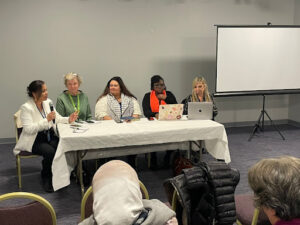
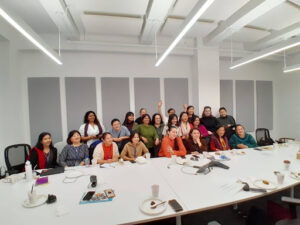
CSW68
As part of our work within the Women’s Rights Caucus, the Caucus published a statement on the agreed conclusions, welcoming the adoption of conclusions around achieving gender equality through addressing poverty and gender-sensitive financing. MENAFem also took part in several CSW68 events organized by various feminist groups and coalitions, mainly focusing on feminist economic and climate justice.

29th UNFCCC Conference of Parties (COP29) Feminist Reflections:
MENAFem remains committed to fostering an inclusive and diverse conversation on climate negotiations, particularly at the intersection of gender, equity, and social justice. As part of our ongoing efforts to create a platform that highlights a broad range of feminist voices and experiences, we invited individuals from various organizations to contribute blog posts sharing their reflections on COP29. Specifically, we sought feminist perspectives shaped by unique experiences at COP29 in Baku, whether through personal anecdotes from the conference, analysis of current feminist issues, or insights from their work and activism.
Read the reflections series below:
COP29’s Climate Betrayal: Where Are Women in the Justice Equation? – Fiza Naz Qureshi, CAN International
From Injustice to Resistance: The Fight for Climate Justice and Our Future – Safa’ AlJayoussi, Oxfam
A Recap and Reflection on Justice, Movements, and Finance – Shady Khalil, Oil Change International
What’s next after COP 29’s Climate Finance Fiasco? – Emilia Reyes, Equidad
Women at the Front Lines, Men at the Decision Tables – Wafa Misrar, CAN Africa
Events

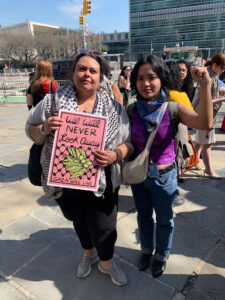
IMF-World Bank Spring Meetings 2024, Washington, D.C.
MENA Fem Movement co-hosted 9 CSPF panels during the 2024 Spring Meetings along with other civil society partners. We also co-hosted 2 side events on IFIs and the G20. MENAFem took part in a World Bank Action Day mobilization during the meetings.
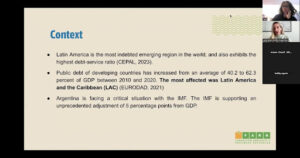
Gender IFI Summer School 2024
As part of our work within the aforementioned working groups, we co-organized the Gender IFIs Summer School and held a session challenging the traditional economic framework focused on GDP and highlighting the impact of austerity measures on the working class, women, and the environment in Global South countries.
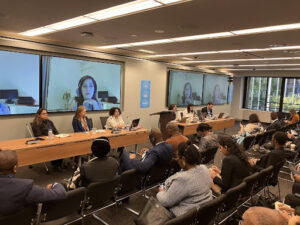
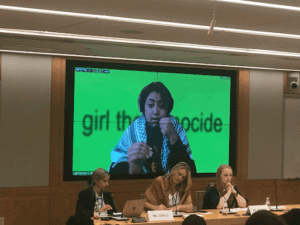
IMF-World Bank Annual Meetings 2024, Washington, D.C.
During the IMF-World Bank Annual Meetings 2024 held this past October, MENAFem’s presence in the Civil Society Policy Forum (CSPF) was substantial. MENAFem led two CSPF sessions, Centering Wellbeing Economics: Rethinking Development In The Global South and Beyond Austerity: Feminist Perspectives On The Role Of Bretton Woods Institutions–the latter of which was co-led by MENAFem member organization, CEWLA. These panels were co-hosted by numerous global, regional, and local civil society organizations. MENAFem also co-hosted various sessions led by other civil society organizations.
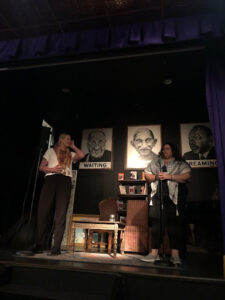
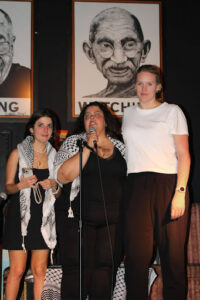

Resist & Revive: A Night of Feminist Art, Beats, and Radical Revelry Against the World Bank and IMF, Washington, D.C.
Building on our 80 years blog project, we held a feminist side-event during the IMF-World Bank Annual Meetings 2024 with WEDO, ActionAid International, Center for Economic and Social Rights, Akina Mama wa Afrika, and the Feminist Macroeconomic Alliance-Malawi (FEAM). This gathering, as an alternative space during the World Bank and IMF Annual Meetings 2024, offered feminists and allies an opportunity to come together, heal, and share global South feminist stories of resistance and reflections on the impacts of colonial, neoliberal, patriarchal, extractive economic hegemony on their lives, work/activism, and contexts. The event also spotlighted creative expression as an act of resistance and solidarity.
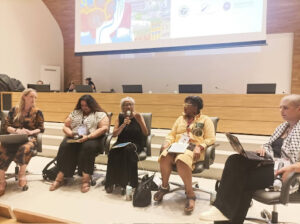
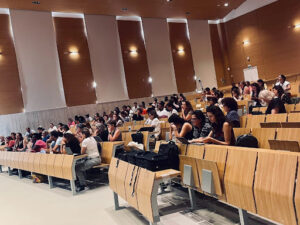
Annual IAFFE Conference, Rome
MENAFem participated in the 32nd Annual International Association for Feminist Economics (IAFFE) Conference in Rome. Our team members attended and participated in panels regarding feminist economics in the Global South, specifically MENA.
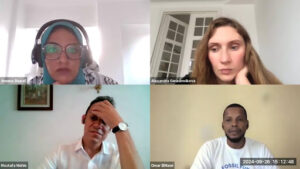
Global Gateway and Green Hydrogen Projects in the Region
MENA Fem Movement for Economic, Development, and Ecological Justice hosted a workshop titled “Green Hydrogen: Producing Energy or Reproducing Colonialism”. The event aimed to examine the green hydrogen transition, focusing on neo-colonial financing mechanisms and its impact on social equity and environmental justice from a feminist and anti-colonial perspective. The workshop provided a regional overview of green hydrogen projects in MENA/WANA, encouraging discussions on feminist, anti-colonial, and inclusive approaches to ensure a just energy transition. The workshop comes as a part of the MENAFem’s project examining the Global Gateway and Green Hydrogen production in the region.
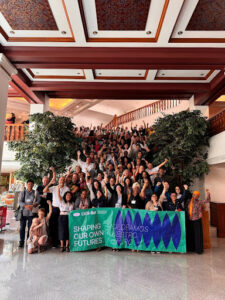
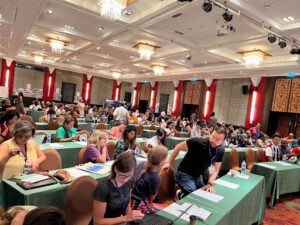
ESCR-Net Global Strategy Meeting 2024, Chiang Mai
MENAFem attended ESCR-Net’s Global Strategy Meeting 2024 in Chiang Mai, where more than 100 members of the network came together to renew bonds of solidarity and reinforce collective action to make human rights and social justice a reality for all, as well as develop collective strategies for the following 5 years.
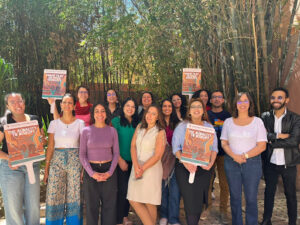
AFMA North Africa 2024, Marrakesh
MENAFem co-organized the African Macroeconomic Academy’s first North Africa cycle in collaboration with FEMNET from April 29th to May 3rd. The academy took place in Morocco and focused on the theme, “Exploring the Feminisation of Agriculture in the Context of Food Security and Climate Resilience.” It brought together 15 participants from the region, from sectors ranging across civil society, academia, movements, and media.
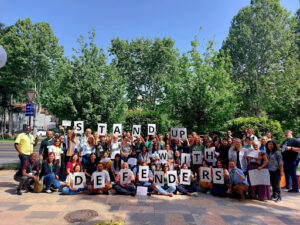
2024 Defenders in Development Gathering, Tbilisi
MENAFem also attended the second meeting of the Defenders in Development campaign in Tbilisi from April 28th to May 1st. The meeting gathered 100 human rights defenders from 50 different countries across the globe to build solidarity, exchange learnings, discuss the key challenges faced by defenders, and brainstorm possible solutions together.
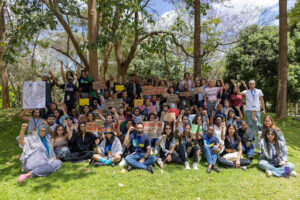
Climate Justice Camp 2024, Arusha, Tanzania
MENAFem played a key role in leading the Gender and Climate track at the third global edition of the Climate Justice Camp in Tanzania, which gathered 300 young climate leaders from highly impacted regions. This event, the largest in-person platform for youth from the Global South, aimed to foster climate action through workshops on topics like COP negotiations, energy transition, and gender and climate. MENAFem led the discussions linking between gender and climate issues, integrating feminist principles into climate action, and fostering movement-building workshops. The camp also highlighted the importance of community financing and collective advocacy for equitable policies. Participants left with renewed hope, seeing the principles of climate justice as inseparable from human rights and anti-colonialism, reinforcing the necessity of global solidarity in the fight against environmental degradation.
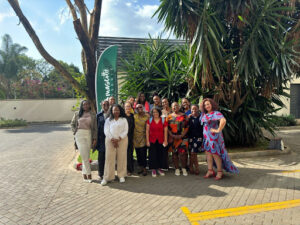
African Continental Free Trade Agreement Pan-African Teach-In, Nairobi
MENAFem attended a pan-African teach-in on the African Continental
Free Trade Agreement, held in Nairobi by Nawi Africa. The teach-in brought together feminists from across the continent to delve deep into the agreement’s protocol on women and youth. We explored opportunities and challenges, laying the groundwork for impactful advocacy.
Research and Publications
This year, we also conducted some in-depth research and published several publications.
MENAFem/Feminist Action Nexus Resources
At the outset of the year, we–in collaboration with WEDO–launched five resources translated into Arabic on the profound gap between the existing global order and the feminist vision for economic and climate justice advocated by the Feminist Action Nexus. We also held a launch webinar for these resources.
MENAFem x Greenpeace: Extractivism and Wellbeing Economics
We have been working on an in-depth research project in collaboration with Greenpeace MENA on extractive European investments in Egypt and Morocco and the need to move past this model for a feminist and just economic transition. We expect to launch this project early next year through a webinar, as well as launch a podcast on feminist economics in Arabic for regional listeners.
IDA21
We published a position paper, detailing our full position on the IDA21 policy package and replenishment report as part of our engagement with World Bank policies and processes.
Annual Meetings 2024 Feminist Reflections
MENAFem published its periodic reflections on IMF-WB Annual Meetings detailing the most “interesting” aspects of the meetings, emerging topics, and the team’s thoughts on them.

COP TROIKA
MENAFem co-published the COP Troika report alongside Oil Change International, 350.org, and Observatório do Clima. With COP approaching, civil society recognized the urgency of addressing the Troika’s upcoming NDCs, which would set the bar for those to follow. To respond to this, a timely report was crafted to directly challenge the projected NDCs and their external messaging as being aligned with the 1.5°C target. The report emphasized the responsibility of the U.S. and other major Global North emitters to phase out emissions the fastest and to the greatest extent.
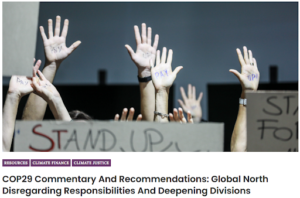
The New Collective Quantified (NCQG) Goal
COP29 was deemed a failure after its failure to achieve fair and equitable frameworks for financing. We published our report on the New Collective Quantified Goal (NCQG) titled “Global North Disregarding Responsibilities and Deepening Divisions”, which was introduced to address the shortcomings of the 2009 $100 billion annual climate finance goal, which fell short in both scale and urgency. The NCQG aims to meet the estimated $5–$6.9 trillion needed for climate mitigation and adaptation in developing nations. However, its success hinges on creating an effective system for mobilizing and distributing public funds, as well as holding developed countries accountable for their financial commitments. At COP29, parties failed to agree on an NCQG that adequately addresses the needs of loss and damage, incorporates gender-responsive financing, meets the priorities of developing countries, and upholds the principles of a Just Transition.
Click the file below for the pdf of our 2024 recap.


